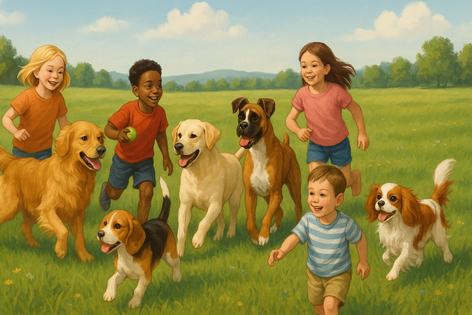Five Dog Breeds That Make the Best Family Pets for Households With Young Kids
Published in Cats & Dogs News
When choosing a dog for a household with young children, temperament, energy level, and trainability are key factors. For families with kids under 10, the ideal canine companion is patient, friendly, and adaptable to a bustling environment. While every dog has its own personality, certain breeds are particularly well-suited for young families due to their gentle nature and playful spirit.
The Labrador Retriever has long been one of the most popular dog breeds in the United States, and for good reason. Labradors are known for their affectionate disposition, intelligence, and eagerness to please. These dogs are highly trainable and excel in obedience, making them ideal for households where consistent routines and boundaries are key. Labradors also have a famously tolerant and gentle nature with children. They enjoy active play and are energetic enough to keep up with kids, whether it’s a game of fetch in the backyard or a family hike. Their short coats require minimal grooming, and their sturdy build means they can handle the occasional roughhousing that may come from toddlers or elementary-aged children.
Closely related in temperament to the Labrador, the Golden Retriever is another top pick for families. Goldens are gentle, patient, and loyal—three qualities that make them excellent companions for young children. Their calm demeanor and reliable disposition are well-documented, and they typically get along with everyone they meet, including other pets. Golden Retrievers do require regular grooming due to their thick, wavy coats, and their energy level means they benefit from daily exercise. But for families seeking a devoted dog who is affectionate and intuitive, the Golden Retriever remains a perennial favorite.
For families who want a smaller-sized dog that’s still energetic and friendly, the Beagle is a strong candidate. Beagles are curious, social, and thrive on companionship, which makes them especially compatible with children. Their even temper and playful attitude ensure they fit in well with active households. Because Beagles were bred to hunt in packs, they’re naturally inclined to be around others—both humans and animals. They are known to be vocal and can be stubborn, so early training and regular walks are important. Still, their manageable size and cheerful nature make them a great choice for families living in both houses and apartments.
For families with young children who want a smaller dog that is gentle and affectionate, the Cavalier King Charles Spaniel is hard to beat. This toy breed is known for its calm temperament and eagerness to be close to its people. Cavaliers are often described as lap dogs, but they are also playful and alert, enjoying games and walks just as much as cuddles. Their small size makes them easy to handle, even for younger children, and they are generally patient and tolerant. Cavaliers do have long, silky coats that require regular brushing, but their sweet and adaptable personality often outweighs the grooming demands for many families.
Although their muscular build and intense expression might suggest otherwise, Boxers are among the most affectionate and protective family dogs. Known as “the Peter Pan of dog breeds” because of their youthful energy, Boxers are fun-loving and patient—qualities that make them excellent companions for kids. Boxers tend to bond closely with children and enjoy being active members of the family. They are alert and make good watchdogs without being aggressive. Because of their strength and energy, early training and regular exercise are crucial. Families who are ready to provide an outlet for a Boxer’s enthusiasm will find a loyal, loving friend.
While many breeds can be wonderful with children, individual temperament, socialization, and training ultimately play the largest role in how a dog fits into a home. Families should consider their lifestyle, home environment, and the needs of both the child and the dog before choosing a breed. Animal shelters and breed-specific rescues can also help match families with the right dog, regardless of breed. In the end, the best dog for your family is one that fits your rhythm, shares your energy, and becomes more than a pet—a beloved member of the household.
========
This article was created, in part, utilizing AI tools









Comments